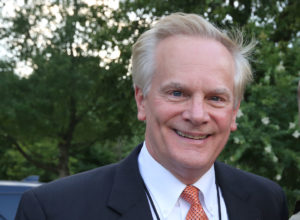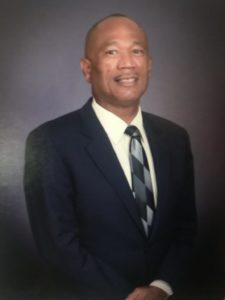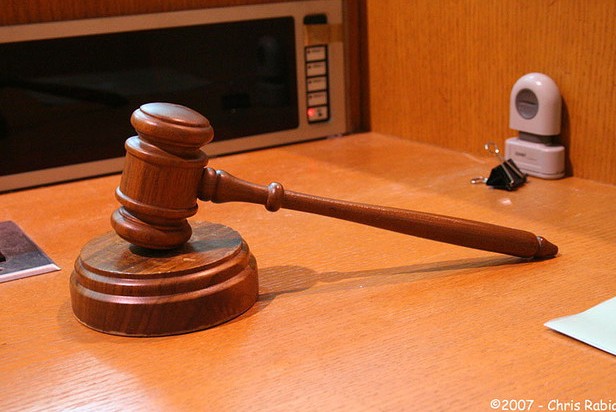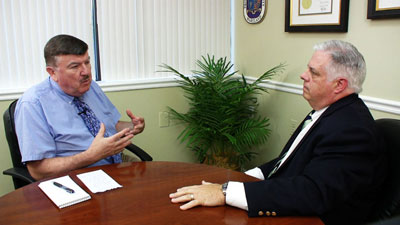This is an expanded version of a story that runs in the March issue of The Business Monthly serving Howard and Anne Arundel counties.
By Len Lazarick

Judge John Kuchno. (Campaign website)
John Kuchno was leaving the Columbia Athletic Club on Dec. 19, 2018, after a morning workout when his phone rang.
“I didn’t recognize the number from Annapolis. And I picked it up and I said hello.
And the voice on the other line said, ‘John, Larry Hogan, how ya doing?’ And I said, ‘Governor, I think I’m about to do pretty well.’”
Yes, the governor appointed Kuchno, 62, as a Circuit Court judge in Howard County. The appointment culminated a months-long process that includes a lengthy application form, interviews with specialty bar associations and the Judicial Nominating Commission set up by the governor to send him nominees. Thirteen lawyers applied, the commission sent five names to the governor, whose office does its own vetting, and finally comes a face-to-face sit-down with the chief executive.
Now after decades of practicing law, including the last eight years in the office of the Maryland attorney general as senior counsel for civil litigation, Kuchno is a trial judge in Ellicott City, handling the full range of criminal and civil cases. He’s making $164,433.
At least for now. He can only keep the job if he wins the June 2 primary and general election against three other local attorneys, two of whom went through the same grueling vetting for the vacancy but didn’t get their names sent to the governor.
Changing the system
It’s a system that judges, attorneys, and legislators have tried to change for years, since no other judges in Maryland must run this way. Judges on two appeals courts run in retention elections in which voters get to say yes on no on them staying on the bench. But voters have never tossed an appellate judge out of office. They generally get 80% yes votes.
But new sitting judges on the Circuit Courts around the state have lost elections to challengers.
One of the ironies of Kuchno’s situation is that he replaced retired Judge Lenore Gelfman, a former district court judge who won a contested election in 1996, unseating Judge Donna Hill Staton, the older sister of Del. Terri Hill.
Staton was the first African American on the Howard County Circuit Court and it was an ugly election campaign, as she testified in Annapolis in February. Staton went on to have a distinguished legal career, becoming a deputy attorney general and serving on the state Board of Education.
One of the odd quirks of the current system is that the candidates for judge are supposedly “non-partisan” but they actually run in both the Democratic and Republican primaries. Independent voters don’t get to vote on them, as they do in the truly nonpartisan Board of Education primary.
On top of that, to run campaigns to keep their jobs, judges also wind up raising money from the same lawyers who appear before them in court.
“It is time to take politics away from a place it does not belong,” said Sen. Delores Kelley, lead sponsor of legislation to have circuit judges run in retention election (SB596).
The legislation was backed by three chairs and vice-chairs of the four Senate standing committees. Sponsors included African American lawmakers who have often joined with Republicans in opposing attempts to change the current system because governors have not treated them fairly, and tended to appoint white, male Democrats to the bench.
Republicans on the Senate Judicial Proceedings Committee expressed skepticism about attempts to change the way changes are selected.
None of several bills to change the judicial election process moved out of committees in the Senate and the House.
Challengers say it’s unfair
Current challengers to sitting judges have some of the same complaints about the current process and see the heavy hand of politics there too because of the governor’s control.

Stephen Horvat. (Campaign website photo)
“Given the fact that the governor picks the 13 people” on the nominating commission, “I don’t think it is fair,” said Z. Stephen Horvat. Bar associations nominate seven members from which the governor appoints five.
“There’s no check on the power of the governor,” since the state Senate does not confirm the circuit court judges as it does for the appointment of appellate and district court judges, even though these confirmations are fairly routine. “Everything is political.”
As to the proposal to replace contested elections with retention elections, “those are like having North Korean elections,” Horvat said. Under the current system, “the people ultimately get to decide.”
Horvat, 55, has been practicing law since 1997, the last 12 years with the Ruckdeschel Law Firm LLC, a “boutique law firm” specializing in asbestos litigation representing clients with mesothelioma.
Horvat does not dispute that Kuchno is qualified. “I will not disparage Judge Kuchno or any of my competitors.” But he asked whether the judges that get appointed are “better than the ones that run?”
“No, they are not better,” said Horvat, citing examples of appointed judges who guilty of road rage, slashing tires and other misconduct.
He does criticize Kuchno for taking “$30,000 from law firms that appear before the court,” and said, “the vast majority of my campaign is self-funded.”
A review of the campaign finance reports filed in January shows that Kuchno raised $35,000 from over 100 people with mostly smaller contributions ($500 or less) from Maryland lawyers. His largest contribution of $6,000, the maximum allowable, came from a D.C. lawyer with a federal practice and he has many contributions from non-lawyers. Horvat’s filing shows that $13,000 of the $16,450 he raised last year came from out of state, including $8,000 from out of state law firms.
‘Whole process is political’

Stephen Musselman. (Facebook)
Like Horvat, long-time public defender Steve Musselman went through the nomination process, but his name was not sent to Hogan. “The whole process is political, even when it is a Democratic governor,” Musselman said.
“I think the electorate should be able to look at the values they want in a judge,” said Musselman, 52. He proudly bills himself as “a progressive” on his campaign sites, and unlike the other candidates, he takes positions on issues that might be regarded as outside the guidelines for judicial candidates.
For instance, “I will never use cash bond,” the current system of bail for criminal defendants. “I think it’s unconstitutional.” He also opposes interviewing children without the presence of a parent or a lawyer. “It violates due process. I think it’s fundamentally unconstitutional.”
And “I have no objection to cameras in courtrooms,” an issue on which Kuchno declined to take a position in an interview.
Kuchno also declined to divulge his party registration, saying “it’s irrelevant.” But Musselman says “it is relevant” that Kuchno was a Republican. Party affiliation tells voters about your views on “the world and your relationship to people,” said Democrat Musselman.
The nominating commission in Howard County in Howard County is currently chaired by attorney Joan Becker, a former chair of the Republican Central Committee. About half the members of the commission are Republicans, with at least three Democrats and no party registration available for three members.
Musselman has officially filed that he will not raise or spend more than $1,000 on his campaign, and said, “I have fundamental problems with the appearance of conflict of interest” with judges accepting contributions from attorneys who come before them.
Quincy Coleman

Quincy Coleman. (Campaign photo)
Quincy Coleman, another Kuchno challenger, has a similar problem with accepting contributions from attorneys, and has raised and spent little on his campaign other than a $5,000 loan to himself.
Coleman, 65, spent 20 years as a public defender in Maryland and before that was a parole and probation agent. “I’ve had a long career advocating for various people; I’ve helped a lot of people.”
He did not apply to be appointed to the court this time, but he has applied to be a district court judge in the past.
“It’s a fair process, but it’s not the only process we should go through,” Coleman said. “Sometimes even people who are highly qualified get overlooked. It’s not perfect as far as selecting judges.”
Challengers in other counties
UPDATE 3/27: Carroll County was missing in this roundup of other challengers.
Many of the judges on county ballots around the state have no challengers, including jurisdictions where they have been frequent challenges in the past, such as Baltimore City (five sitting judges, including two seeking second 15-year terms) and Baltimore County (two judges). There is an interesting racial dimension to the challenges.
Across the state, there are 13 attorneys challenging 16 sitting judges in four counties. Seven of the 13 challengers are African American, including five women, despite the fact that in three of the four counties they are challenging slates that include four African American women appointed by Hogan. On the Prince George’s County ballot, there are five sitting Circuit Judges on the ballot (three women, including two African Americans, and two men), and two challengers, April Ademiluyi and Gladys Weatherspoon, both African American women.
In Montgomery County, there are four sitting judges (one African American woman) on the ballot and two challengers, Thomas B. Johnson III and Marilyn Pierre, both African Americans.
UPDATE: In Carroll County, Judge Richard Titus is being challenged by Laura Morton and George Psoras Jr.
In Charles County, Judge Patrick Devine is being challenged by two African American women, Adrienne Davis and Makeba Gibbs.
In Anne Arundel County, where the lack of African Americans on the bench has produced challenges in previous years, there are two white challengers to a slate of four sitting judges that includes the first African American woman ever appointed there, Elizabeth Morris. The challengers include former state’s attorney Wes Adams, a Republican who lost his bid for reelection in 2018, and Annette DeCesaris.







Recent Comments